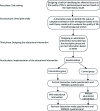Effects of an educational intervention based on the multi-theory model on promoting the quality of life in postmenopausal women: a protocol
- PMID: 31975982
- PMCID: PMC6970419
- DOI: 10.5114/pm.2019.90808
Effects of an educational intervention based on the multi-theory model on promoting the quality of life in postmenopausal women: a protocol
Abstract
Introduction: Menopause is associated with symptoms and complications that can affect women's quality of life. Therefore, acceptance of the symptoms and complications can improve quality of life during this period. In this regard, the purpose of this study was to design an educational program based on the multi-theory model (MTM) to deal with complications of the menopausal period and improve the women's quality of life.
Material and methods: In designing this study, four phases are considered. In the first phase, the questionnaire of menopausal symptom acceptance behaviors will be designed based on the MTM using literature review and a panel of experts' viewpoints. The validity and reliability of the questionnaire will be confirmed at this stage. In the second phase, a descriptive study will be conducted by administering the questionnaire designed in the first phase along with the Menopause-Specific Quality of Life questionnaire. The third phase includes the curriculum design based on the findings of the descriptive study, investigations of various studies, and viewpoints of the experts' panel. Therefore, the main components of the intervention will be identified. These components will determine the influential constructs of the MTM according to the descriptive research. Later, the related interventions and messages will be produced and designed from different sources. Intervention strategies will include group discussion, lectures, confidence-building skills, movie screenings, role play, preparation of daily activities booklets for postmenopausal women, and training classes for husbands and children to improve social support for women. The interventions, contents, and messages designed with the presence of health professionals and members of the target community will be pre-tested by examining factors such as audience perception of the message, appropriateness of the education to the audience's literacy and culture, as well as attractiveness, credibility, and acceptance of the materials. Finally, the fourth phase will be the implementation of the pre-test/post-test educational intervention using the intervention and control groups.
Results and conclusions: The present study provides good information about the needs and strategies to enhance the quality of life in postmenopausal women by utilizing a menopausal acceptance training program. Therefore, designing a program to increase the menopausal acceptance in postmenopausal women can be effective in improving the quality of life and reducing the treatment and medical care costs.
Keywords: educational intervention; menopause; multi-theory model; protocol study.
Copyright © 2019 Termedia.
Conflict of interest statement
The authors report no conflict of interest.
Figures
Similar articles
-
Designing, validation and evaluation of the expert system of "Healthy Menopause" and assessing its effect on the management of menopause symptoms: an exploratory mixed method study protocol.Reprod Health. 2024 Jan 20;21(1):9. doi: 10.1186/s12978-024-01740-1. Reprod Health. 2024. PMID: 38245733 Free PMC article.
-
Effect of the fourth generation multi-theory model intervention on the quality of life in Iranian postmenopausal women: A randomized controlled trial.Post Reprod Health. 2021 Dec;27(4):189-197. doi: 10.1177/20533691211042164. Epub 2021 Nov 18. Post Reprod Health. 2021. PMID: 34792396 Clinical Trial.
-
Designing a Clinical Trial Protocol about the Impact of Family-Based Multimedia Education Based on Telephone Tracking (Tele Nursing) to Improve the Quality of Life and Self-Efficacy in Patients with Myocardial Infarction.Int J Surg Protoc. 2021 May 28;25(1):92-97. doi: 10.29337/ijsp.146. Int J Surg Protoc. 2021. PMID: 34113746 Free PMC article.
-
Empowerment and coping strategies in menopause women: a review.Iran Red Crescent Med J. 2015 Mar 20;17(3):e18944. doi: 10.5812/ircmj.18944. eCollection 2015 Mar. Iran Red Crescent Med J. 2015. PMID: 26019897 Free PMC article. Review.
-
Building Bridges to a Brighter Tomorrow: A Systematic Evidence Review of Interventions That Prepare Adolescents for Adulthood.Am J Public Health. 2018 Feb;108(S1):S25-S31. doi: 10.2105/AJPH.2017.304175. Am J Public Health. 2018. PMID: 29443561 Free PMC article.
Cited by
-
Knowledge, attitude and practice in patients with non-obstructive coronary ischaemia in Xinjiang: a cross-sectional study.BMJ Open. 2025 Apr 27;15(4):e092779. doi: 10.1136/bmjopen-2024-092779. BMJ Open. 2025. PMID: 40288801 Free PMC article.
-
Utilization of the multi-theory model (MTM) of health behavior change to explain health behaviors: A systematic review.Health Promot Perspect. 2024 Jul 29;14(2):121-135. doi: 10.34172/hpp.42887. eCollection 2024. Health Promot Perspect. 2024. PMID: 39291044 Free PMC article.
-
Predictors of regular physical activity behavior and quality of life in post-menopausal Iranian women based on the multi-theory model.J Med Life. 2022 Mar;15(3):408-414. doi: 10.25122/jml-2021-0073. J Med Life. 2022. PMID: 35450004 Free PMC article.
-
Predicting Physical Activity in Chinese Pregnant Women Using Multi-Theory Model: A Cross-Sectional Study.Int J Environ Res Public Health. 2022 Oct 17;19(20):13383. doi: 10.3390/ijerph192013383. Int J Environ Res Public Health. 2022. PMID: 36293962 Free PMC article.
-
Adopting strategies with menopausal experiences: A systematic review.Health Sci Rep. 2024 Apr 17;7(4):e1968. doi: 10.1002/hsr2.1968. eCollection 2024 Apr. Health Sci Rep. 2024. PMID: 38633735 Free PMC article.
References
-
- Sheikhan Z, Ozgoli G, Azar M, et al. . Prevalence of sexual violence among infertile women. Adv Nurs Midwifery 2014; 23: 5836.
-
- Perry S, Bobak I. Maternity &Womens Health Care. Mosby Company, London: 2000.
-
- Norozi E, Mostafavi F, Hasanzadeh A, et al. . Factors related with quality of life among postmenopausal women in Isfahan, Iran, based on behavioral analysis phase of precede model. Health Syst Res 2011; 7: 267-277.
-
- Karaçam Z, Şeker SE. Factors associated with menopausal symptoms and their relationship with the quality of life among Turkish women. Maturitas 2007; 58: 75-82. - PubMed
-
- Krajewska-Ferishah K, Krajewska-Kułak E, Terlikowski S, et al. . Analysis of quality of life of women in menopause period in Poland, Greece, Belarus and Belgium using MRS Scale. A multicenter study. Adv Med Sci-Poland 2010; 55: 191-195. - PubMed
LinkOut - more resources
Full Text Sources

